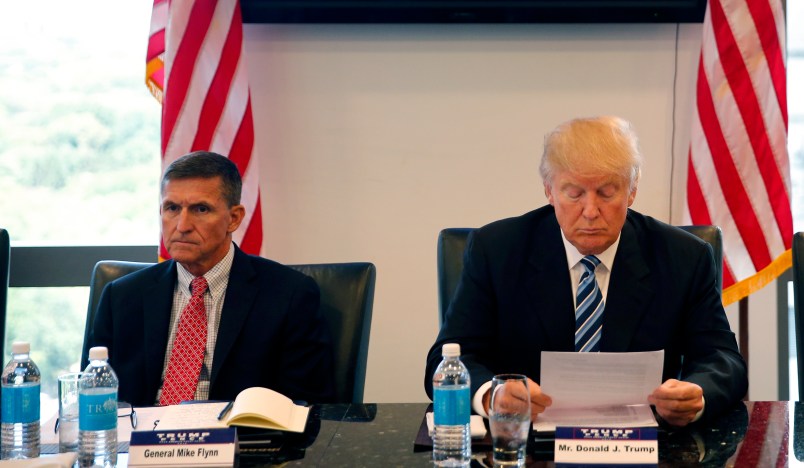Among the many new questions following former National Security Advisor Mike Flynn’s guilty plea Friday to lying to the FBI is: Why did he lie in the first place?
By the time Flynn was interviewed by the FBI in late January 2017, his contacts with Russian ambassador Sergey Kislyak had been publicly reported. As Flynn’s guilty plea alleges, other members of Trump’s orbit had not just been aware of the contacts since they happened but had discussed them and even directed them in real time.
Here’s a run down of the sequence of events that makes Flynn’s decision to try to conceal the content of his contacts with Kislyak so mystifying.
We now also know that other people in Trump’s orbit knew about, and even directed, Flynn’s message to Kislyak about the sanctions.
As the Mueller filings detail, before talking to Kislyak, Flynn called a “senior official of the Presidential Transition team” who was with “other senior members” of the team at Mar-A-Lago, and they discussed that the “members of the Presidential Transition team at Mar-A-Lago did not want Russia to escalate the situation.”
And yet by Jan. 24, he made “materially false statements” in a FBI interview about whether he discussed sanctions with Kislyak on a Dec. 29 phone call, among other things. The interview took less than two weeks after Washington Post columnist David Ignatius first reported the call.
The Ignatius column was met with bitter rebuttals by members of Trump’s incoming administration, even as they acknowledged the call took place. They denied it had anything to do with sanctions the Obama administration was in the process of imposing on Russia, as Ignatius had floated.
“The call centered around the logistics of setting up a call with the President of Russia and the President-elect after he was sworn in, and they exchanged the logistical information on how to engage and schedule the call,” incoming White House Press Secretary Sean Spicer told reporters on Jan. 13. “I believe David Ignatius will print a — I don’t want to call it a correction — an update to more accurately reflect the events that day now that he has provided the information.”
Indeed, an update was added to the column to provide that explanation, as well as other non-sanctions topics Trump officials claimed Kislyak and Flynn had discussed.
Had Flynn lied to Spicer and the other Trump officials claiming sanctions hadn’t come up?
Either way, Flynn — a retired three star general who once served as the director of the Defense Intelligence Agency — then lied to FBI agents about the details of the call, even after he knew a “U.S. government official,” as Ignatius sourced his report, was aware of the call and leaking it to the press.
Sally Yates, the top official at the Justice Department at the time, alerted the White House a few days later and on multiple occasions that Flynn had been lying to senior officials about his contact with Russian officials. (She was later fired for refusing to defend in court President Trump’s travel ban.)
But Flynn remained in his role as NSA for more than two weeks after that, and was only ousted when the Washington Post and others confirmed that sanctions had come up on the call.
The Post’s report was based on “officials who had access to reports from U.S. intelligence and law enforcement agencies that routinely monitor the communications of Russian diplomats.”
Had Flynn not thought of the possibility that his call with Kislyak could have been under surveillance when he talked to the FBI? Or was there just something bigger that he was trying to hide?
By the account of the Trump administration, he was fired for lying to Vice President Mike Pence, who claimed after the Jan. 12 report that Flynn had told him that he “did not discuss anything having to do with the United States’ decision to expel diplomats or impose censure against Russia.”
Pence, it’s worth noting, was in Indiana during the time of the call. But at least handful of people knew about the phone call’s subject matter at the time that it happened. Did they know about Flynn’s decision to lie to the FBI about it as well?







My guess, and I imagine it’s what Tierney is suggesting - Trump told/ordered him to lie about it. Not saying that’s the answer, but wouldn’t it fit everything we know about His Orangeness?
Flynn lied because he thought he could get away with it, and of course $$$$$.
Perhaps Trump’s team was already laughing that the president could pardon anything they did, without thinking through that prosecutors might reserve some charges for the state legal systems, where they can’t be pardoned by the president.
Flynn Facts?
Or did the trump cabal really think that they could keep this information from coming out? (Of course, they’ve managed to do untold damage in the almost-a-year since Flynn lied, and if he’d told the truth there might have been other questions that would have hobbled the administration in its early days.)
No, Trump and his minions will say it was Obama who did it.